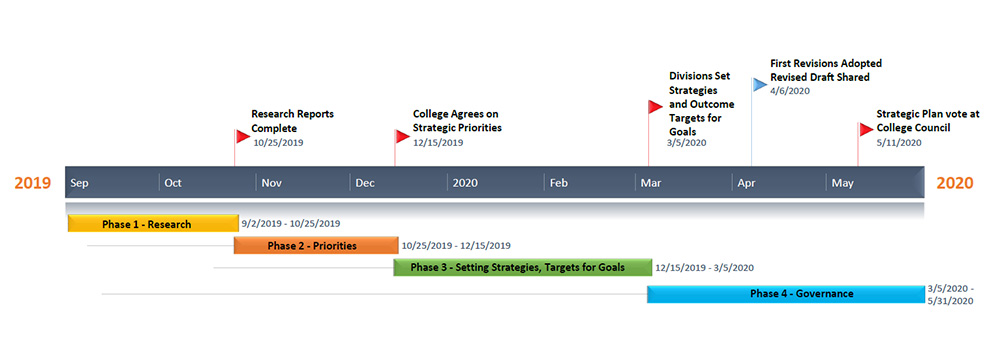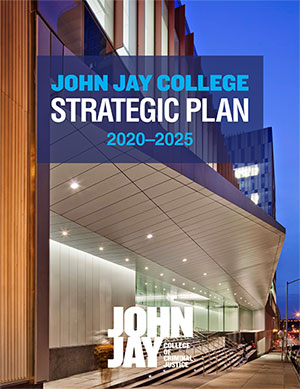
Strategic Planning Process 2019-2020
John Jay’s mission is unique, and forms a trust between the college and the community we serve. All that we do at the college should flow from our mission. To ensure we keep our mission at the center of what we do, we must refresh our attention to those high ideals by having clear plans for how best to deliver on their promise.
As we come to a close of our 2015-2020 Strategic Plan, we will spend the 2019-20 academic year in community dialogue, debating and selecting the priorities that should guide our actions from 2020-2025. As ever, a clear focus on how best to align our resources with our priorities will help us deliver on our mission, which calls on us to explore justice in its many dimensions, equip students for advanced study and meaningful careers, prepare students for ethical leadership, global citizenship and engaged service, and advance the knowledge that informs professional practices and builds and sustains just societies. Further, our mission guides us to nurture and support an inclusive and diverse community and in doing so actualize our commitment to educating traditionally underrepresented groups and increasing diversity in the workforce.
But how best to do so? That will be our talk and our work over the four phases of the strategic planning process this year.
In Phase 1 (September-October 2019) we will charge ten groups with researching the environment of higher education, the best practices in higher education, and John Jay’s position within these trends.
In Phase 2 (November-December 2019) all members of the college community will read the proposed priorities and provide feedback on which priorities they think it best for the college to select. The SPS will use this feedback to recommend priorities to the President, who will approve a final list.
In Phase 3 (January-February 2020) the President and Vice Presidents and teams will be responsible for creating strategies, targets and outcomes for the chosen priorities.
In Phase 4 (March-May 2020) a drafted strategic plan will be shared with the college community, will be revised according to feedback delivered by mid-April, and will be submitted to the College Council for adoption in May 2020.
Strategic Planning Subcommittee (SPS)
The Strategic Planning Subcommittee (SPS) has responsibility, according to the college charter, to “provide guidance to the President on comprehensive and strategic planning including development of major planning documents and accreditation studies, related process and outcome assessment and space planning.”
In 2019-2020 SPS will serve as the advisory and planning body, working with the college community, to structure a strategic plan that aligns with the John Jay College mission and our 2019 Vision for Student Success and sets the college’s priorities from 2020-2025. Our goal is to create an open, transparent process that engages the campus community in each phase of the planning process.
Members of Strategic Planning Subcommittee, 2019-2020
Yi Li Provost and VP for Academic Affairs (Chairperson)
Allison Pease Interim Associate Provost for Institutional Effectiveness (designated chair)
Steve Titan Vice President of Finance and Administration
Warren (Ned) Benton President of the Faculty Senate
Karen Kaplowitz Two (2) representatives chosen by the Faculty Senate
Erica King-Toler
Angela Crossman Chair of the Council of Chairs
Warren EllerTwo (2) representatives chosen by the Council of Chairs
José Luis Morín
Brian Cortijo President of the Higher Education Officers Council
Musarrat Lamia One student representative
The Director of Institutional Research, Ricardo M. Anzaldua and the Director of Outcomes Assessment, Dyanna Pooley, shall staff the subcommittee.
PHASE 1 – Fall 2019
In Phase 1 of the planning process we charged eleven research groups consisting of faculty, staff, administrators, and students to look outside the college and investigate current trends and best practices in higher education. These groups were then asked to consider John Jay’s strengths, weaknesses and opportunities in relation to these trends. Below is a listing of the research groups and the trends they explored.
1. ENROLLMENT: What will student enrollment and demand for our programs be in the next 5-10 years? VP Ellen Hartigan (EMSA), Henry Chan (IE), Wynne Ferdinand (UGS), Prof Jennifer Holst (MAT), Prof Heath Brown (PAD), Musarrat Lamia (student)
2. ONLINE EDUCATION: How are colleges improving student learning AND maximizing resources by offering more online courses? Interim AP Allison Pease (IE), Joe Laub (IT), Judy Cahn (OOES), Prof Dan Yaverbaum (SCI), Prof Al Coppola (ENG), Kermina Tofek (student), Anthony Leonardo (student)
3. JUSTICE EDUCATION: What are national trends in criminal justice and justice education, and how can John Jay be a thought-leader in the areas of criminal and social justice? Dean GS Avi Bornstein, Diego Redondo (Public Safety), Prof Casey LaDuke (PSY), Prof Brian Lawton (CJ), Prof Michael Yarbrough (POL), Jasmine Chevez (student)
4. FUNDING: What are best practices in financing public colleges in an era of state divestment? AVP Mark Flower (F&A), Prof Melissa McShea (PAD), Prof Ned Benton (PAD), Jasmin Letamendi (SA), Aamash Mussa (student)
5. CAREER READINESS: What are current career trends that affect how our programs and students’ skills align upon graduation? Dean Dara Byrne (UGS), Henry Chan (IE), VP Robin Merle (IA), Steve Dercole (IA), Prof Samantha Majic (POL), VP Steve Titan (F&A), Adam Fane (student), Carlos Hines (student)
6. CULTURAL COMPETENCE: Given our commitment to serving those students who make us an HSI and an MSI, what are trends and best practices for promoting cultural competence and inclusivity among faculty, students, and staff in higher education? In what ways do colleges measure student, faculty, and staff levels of cultural competence, awareness, and sensitivity regarding issues of difference? AVP Sumaya Villanueva (AA), Hing Potter (EMSA), Prof Nancy Velasquez-Torres (CSL), Prof Jama Adams (AFR), Prof Amy Green (DIS, Sergine Louis (HR), Musarrat Lamia (student)
7. STUDENT SUCCESS: What are the best practices to improve student retention and graduation for populations like John Jay’s? Provost Yi Li, Christina Di Meo (UGS), Prof Nina Rose Fischer (DIS), Manny Chaparro (UGS), Angelina Benley (student)
8. RESEARCH: What are the best practices for supporting faculty research at non-R1 institutions, and how do they best partner with industry/commerce? Dean Anthony Carpi (R), Prof Nathan Lents (SCI), Prof Cathy Widom (PSY), Prof Maureen Allwood (PSY), Prof Jerry Markowitz (DIS), Preeti Chauhan (DCJ), Gina Foster (TLC), Ariana Kazansky (student), Nickolas Almodovar (student)
9. GOVERNMENTAL CLIMATE: What are the local (CUNY + New York City), state (NYS), and national demands and trends regarding public education (or John Jay) that will affect John Jay? VP Laura Ginns (PA), Mindy Bockstein (PA), Prof Ke Li (POL), Prof Peter Mameli (PAD), Naomi Davies (F&A), Kermina Tofek (student)
10. TECH AND HIGHER ED: What are enterprise/tech solutions that are positively affecting the ways colleges operate? Joe Laub (IT), Prof Aftab Ahmed (CIS), Jarrett Foster (EMSA), Prof Karen Okamoto (LIB), Fidel Osorio (student)
11. CLIMATE JUSTICE: Global warming affects us now and will continue into the future. As a college committed to justice, what can we do to live up to our mission with regards to this ecological and humanitarian crisis? Prof Alexander Schlutz (ENG), Prof Gerry Markowitz (DIS), Prof Lindsey Kayman (adjunct), Prof Joan Hoffman (emeritus), Musarrat Lamia (student)
PHASE 2 – Fall 2019
An effective institution, especially one with limited resources like John Jay, must focus its attention and resources intentionally towards those things it knows are most important to its ability to carry out its mission.
To that end, we ask the entire campus community to participate in Phase 2 of the planning process and weigh in on John Jay’s goals for the next five years.
The research from Phase 1 has been compiled into a research briefing book that positions John Jay in the context of higher education trends and best practices, and makes recommendations for strategies to pursue. From that research the Strategic Planning Subcommittee proposes the following priorities for your consideration. Please keep in mind that the goals of a strategic plan must be very high level and echo our mission; we will form more detailed priorities, targets and strategies that align with our determined goals in the next phase.
- Advance undergraduate and graduate student success through a holistic, student-centered educational model.
- Promote diversity, inclusion, equity, access, and cultural competence in the classroom, across the campus, and in post-graduate contexts.
- Build financial stability and sustainability including a focus on enrollment, the environment, and space.
- Be a leader in justice education, research, and public engagement.
- Improve organizational capacity, effectiveness, and excellence by investing in staff, faculty and infrastructure.
We ask that you now tell us what you think of these priorities. Keeping in mind that the college will continue to move forward on all fronts, we ask how you would order these priorities, and in what ways would you shift the emphasis of these priorities to move toward the college you want John Jay to be in five years? Strategic priorities allow us to move the institution significantly toward those goals, and keep us focused on achieving our mission.
Be sure to discuss these proposed goals with your colleagues, your departments, and the governance bodies in which you participate. Provide feedback here on this form and through your governance bodies or by participating in the Community Conversations scheduled as follows: ·
- Wednesday, November 6, 1:40-3:00 p.m. in NB 1.99
- Thursday, November 14, 1:40-3:00 p.m. in NB 1.99
- Monday, November 25, 1:40-3:00 p.m. in NB L2.85 (Faculty Only session)
- Wednesday, December 4, 1:40-3:00 p.m. in NB 1.99
The SPS will weigh all feedback thoughtfully, and with the institution’s ability to deliver on its mission foremost in consideration.
Thank you for participating in the shared governance of John Jay.
PHASE 3 – Spring 2020
After extensive community discussion about the direction and priorities of John Jay in fall 2019, President Mason has, at the recommendation of the Strategic Planning Subcommittee, adopted the following four goals to direct our actions between 2020-2025.
2025 Strategic Plan Goals:
- Educate and support undergraduate and graduate students at every step of their John Jay journey.
- Create and advance knowledge in support of justice education, public awareness, and civic engagement.
- Embody and promote our values of equity, diversity, and inclusion.
- Improve and expand financial resiliency, operational efficiency, and the College’s sustainability.
Until March 2020, President Mason, the Vice Presidents, and the leadership of each division of the college will be in dialogue about how best we actualize these goals. The President’s Leadership Council will discuss and together agree on cross-divisional objectives and key performance indicators. The object of this phase of the planning process is to provide specific, measurable, and achievable goals that will drive college activity and assessment for the next five years.
PHASE 4 – Spring 2020
Over the course of this academic year, the entire college community has had the opportunity to share their thoughts about this plan. Now we are pleased to share a draft for a final comment and revision period before we put the plan forward to the College Council for a vote.
Community Conversations about the drafted strategic plan with values, vision, mission, goals, objectives, benchmarks and key performance indicators will take place via ZOOM on the following dates:
1. April 15 1:45-3:00 pm, facilitated by Yi Li and Ned Benton
ZOOM LINK April 15 https://jjay-cuny.zoom.us/j/469670962?pwd=NWxaR01FQyt1VER2czZmYUFsSW0vQT09
2. April 21 6:00-7:15 pm, facilitated by Erica King Toler and Musarrat Lamia
ZOOM LINK April 21 https://jjay-cuny.zoom.us/j/726209711?pwd=WVJycm10VW9PODdQMktuU2MxZUEwZz09
3. April 21 1:45-3:00 pm, facilitated by Angela Crossman and Jay Gates
ZOOM LINK April 23 https://jjay-cuny.zoom.us/j/564475655?pwd=bXE3VFJOSU01VkdZaHV0S1NCZmN1QT09
Once we have collected all feedback, the SPS will weigh all feedback thoughtfully, and with the institution’s ability to deliver on its mission foremost in its consideration. A final revision will be presented to the College Council for approval at the end of the spring 2020 semester or at the beginning of the fall 2020 semester, depending on governance deadlines.
Click here or image to view enlarged timeline


